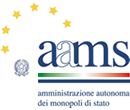Regulation and Conditions
Online Poker: regulated and peculiar
 Italy seems to be the flagship project when it comes to regulate the national online poker market, but it has come a long way. Back in 2006, internet service providers were ordered to block all gaming entities located outside of the country's borders, refusing Italian players access to the games of more than 600 companies. The European Union showed up to be shocked, lifting the block. This is where talks started how a national sanction and regulation can be done. In February 2009, Italy reached an agreement on changes to their own gaming laws, which went into effect on July 27th, 2009. Since that date, Players and the servers housing the games must both be within Italy's borders, but for the first time online poker is regulated as a legal skill game under the AAMS (Amministrazione autonoma dei monopoli di Stato). At first tournaments were the only acceptable way to play poker online, but after a year of discussions and rumors the first cash games on .it sites finally started to run in July 2011. From then, Italians can freely play poker at one of the Italy's regulated poker sites.
Italy seems to be the flagship project when it comes to regulate the national online poker market, but it has come a long way. Back in 2006, internet service providers were ordered to block all gaming entities located outside of the country's borders, refusing Italian players access to the games of more than 600 companies. The European Union showed up to be shocked, lifting the block. This is where talks started how a national sanction and regulation can be done. In February 2009, Italy reached an agreement on changes to their own gaming laws, which went into effect on July 27th, 2009. Since that date, Players and the servers housing the games must both be within Italy's borders, but for the first time online poker is regulated as a legal skill game under the AAMS (Amministrazione autonoma dei monopoli di Stato). At first tournaments were the only acceptable way to play poker online, but after a year of discussions and rumors the first cash games on .it sites finally started to run in July 2011. From then, Italians can freely play poker at one of the Italy's regulated poker sites.
Pros and Cons: Italian only, Promotions
Although also cash games and soon the new game types like Zoom by Pokerstars are available to Italian players, the restriction remains to play on Italian sites only, and vice-versa only Italian residents are allowed to play. This makes the market somewhat separated from the rest of the world. Also, because online poker sites now have to pay additional taxes to the Italian government, the costs of the game increases. Meaning, rake is higher and player rewards are weaker than in the rest of the world.
The regulation is still favored by most poker players, as it opens up the market to everybody who was still concerned about the questioning legal state of online poker. Complying with the law, there can also be more comprehensive advertising. New promotions lead to an increased field of players, which adds the availability of certain games, and for regulars improves the possibility to profit of the games and to offset some of the increased costs.
Result: Italy has become the most regulated, most accepted and - since 2010 - the biggest online poker market in Europe!
Taxes: 20% for the poker rooms
The Italian government taxes online poker rooms who operate within their regulations, which is currently set at 20%. As might be expected, at least some of this is passed on to players, although not all of it, as Italian poker rooms have become accustomed to operating with smaller profit margins.
As more and more Italian poker rooms are brought into the fold, this will increase competition, and end up benefiting players by pitting more online poker rooms against each other, resulting in more favorable conditions to those who play at these poker sites.
The Italians have managed to avoid the mistake that the French government has made, as the French set the tax rate considerably higher, and this has caused the regulated online poker market to struggle there, with poker sites losing money and some players becoming upset at the much higher costs. This has caused a much higher percentage of French online poker players to leave the regulated sites in favor of playing at the illegal ones.
Italy hasn’t been too greedy here, and seem to have a better understanding of the market dynamics, where most players are willing to pay a little more in rake to play online poker legally, but if the cost becomes too high, playing illegally becomes more of an option.
Italian players have been much more content to play at the legal Italian poker sites, and in fact the market is growing, not contracting like it is in France. The expectation is that the French will eventually be forced to adjust their model towards one more sustainable, like the one in Italy.
Italian online poker players are expected to declare their poker winnings as taxable income, although this has always been the case. At present, the Italian government does not seem to be spending much effort on going after smaller players, although they have really focused on auditing professional players who reside in Italy. So if you live in Italy, whether you pay tax on your poker earnings is up to you, although if you are looking to comply fully with the law, this would be a good idea.